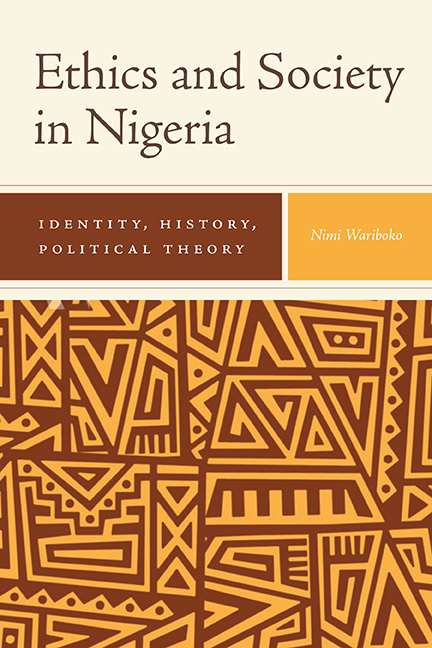Book contents
- Frontmatter
- Dedication
- Contents
- Foreword
- Preface
- Acknowledgments
- Introduction: Dead Gods, Divine Kings, and Deadly Politicians
- 1 The Emergence of the Lotus-Self: Personhood and Identity
- 2 Dead Gods and People's Revolts: Political Theory in Religious Acts
- 3 The Divine King and His Five Bodies: Living History and the Logic of Interreligious Dialogue
- 4 Governance and Deadly Politicians: History as Cultural Criticism
- 5 History without Force: Finding Present Space and Place of Time
- 6 Constructing Nigeria's Greatness: Neglected Paths of Community, Narratives, and Care of the Soul
- 7 Mythos, Virtues, and National Transformation: The Search for a Standard of Citizenship Moral Behavior
- 8 African Traditional Religion and Critical Theory: A Framework for Social Ethics
- Notes
- Bibliography
- Index
1 - The Emergence of the Lotus-Self: Personhood and Identity
Published online by Cambridge University Press: 03 September 2019
- Frontmatter
- Dedication
- Contents
- Foreword
- Preface
- Acknowledgments
- Introduction: Dead Gods, Divine Kings, and Deadly Politicians
- 1 The Emergence of the Lotus-Self: Personhood and Identity
- 2 Dead Gods and People's Revolts: Political Theory in Religious Acts
- 3 The Divine King and His Five Bodies: Living History and the Logic of Interreligious Dialogue
- 4 Governance and Deadly Politicians: History as Cultural Criticism
- 5 History without Force: Finding Present Space and Place of Time
- 6 Constructing Nigeria's Greatness: Neglected Paths of Community, Narratives, and Care of the Soul
- 7 Mythos, Virtues, and National Transformation: The Search for a Standard of Citizenship Moral Behavior
- 8 African Traditional Religion and Critical Theory: A Framework for Social Ethics
- Notes
- Bibliography
- Index
Summary
A specter of disintegration haunts Nigeria; it arises not from disagreement among its component ethnicities. Its referent is an emerging social identity, a consensus on personhood that stands as a powerful barrier to nationhood.
There Was Once a Dream
Let me begin our study of the social identity of Nigeria with a personal reflection on the changes in the images or identifications that the name Nigeria has conjured up in the past fifty-five years. The word Nigeria has been nearly emptied of its originally powerful meaning. While growing up in the 1970s, it had a magical significance, brimming with hope, creativity, and pride. As primary-school children we all thought or were taught that it was in the body of Nigeria that the black race was going to enter into the history of the twentieth and twenty-first centuries with technological power, dignity, and justice. We believed that in the body of Nigeria, in the idea of a very determined and proud group, all the potencies of the black race were concentrated and were arranged in such a way that they could transcend their earlier forms and rise to the level of global respectability. Alas, that Nigeria appears to have slipped away.
Local leaders came to our primary schools and set ablaze our imaginations. They told us we were the leaders of tomorrow and that we should aim to be the best in the world. Thus when I was either in primary three or four and I read somewhere that the average American child read over one million words a year, I decided to out-read every American child. Boy, I did read all the way to first-class honors in economics and earning summa cum laude in ethics at the PhD level, and I am still reading. Somebody, some cruel being, has taken that Nigeria away from me. Where is that Nigeria that can inspire small boys and girls?
When in 1975 soldiers and bureaucrats came to us in the secondary schools and promised that in the year 2000 everything would be great we believed them. As secondary students in forms one and two, we believed the promise wholeheartedly. The Year 2000 campaign fired our imaginations. We were ready to take on the world.
- Type
- Chapter
- Information
- Ethics and Society in NigeriaIdentity, History, Political Theory, pp. 19 - 34Publisher: Boydell & BrewerPrint publication year: 2019



